95% Rise: Bribery In Public Offices
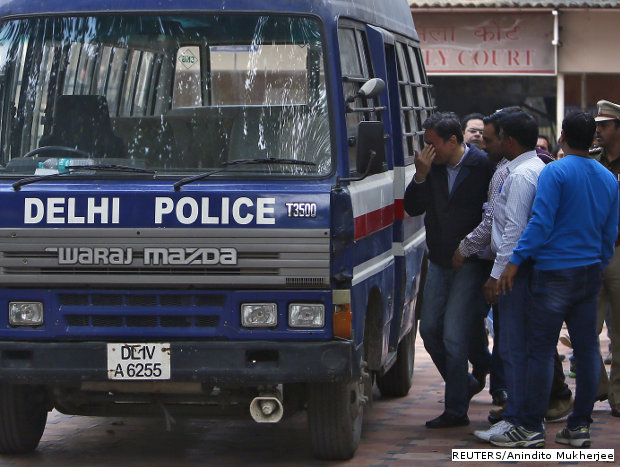
Plainclothes police escorting a person arrested in the case for stealing official documents from the oil ministry.
A recent leak of information at the petroleum ministry revealed a deep nexus between public servants and corporates, the most recent reinforcement of the view that official corruption is endemic across India.
An IndiaSpend analysis reveals that the number of senior government officials involved in public corruption cases investigated by state agencies has increased 95% over the past five years.

Source:NCRB
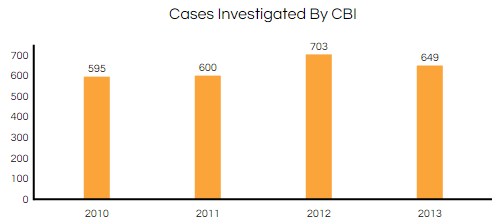
Source:NCRB; Note: Figures for the year 2009 are not available.
The number of cases registered in states and union territories under the Prevention of Corruption Act increased 15%, from 3,683 in 2009 to 4,246 cases in 2013.
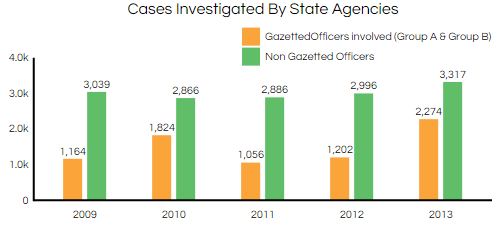
Source:NCRB
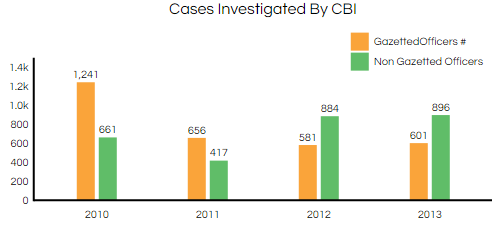
Source:NCRB
The data reveal that in cases investigated by state agencies, the number of gazetted officers involved in corruption cases increased 95%, from 1,164 in 2009 to 2,274 in 2013, while the number of non-gazetted officers accused increased 16%, from 2,866 in 2010 from 3,317 in 2013.
However, in cases investigated by the Central Bureau of Investigation, the number of gazetted officers involved decreased 51%, from 1,241 in 2010 to 601 in 2013, while the number of non-gazetted officers involved increased 115%, from 417 in 2011 to 896 in 2013.
“This is bound to happen," said Jagdeep Chhokar, Founder-Trustee, Association for Democratic Reforms, an advocacy. "Our elections are fought with black money obtained through corrupt practices and political parties have huge sums of unaccounted money. The first step is to make all political parties accountable and transparent with their funding. When the basic electoral process itself is corrupt, then we cannot expect honesty within government offices.”
The petroleum-ministry espionage story also revealed the involvement of private persons in public corruption cases.
Apart from the involvement of corporate executives, the police arrested a former journalist and an energy consultant, both accused of leaking and selling classified documents.
There are differing views on whether the information procured by journalist Santanu Saikia was a legitimate form of journalism. Former investigative journalist Chitra Subramaniam Duella does not believe it was.
“It is not justified for journalists to pay money for leaked information," said Duella, “since it can become a business, as we saw in this case, and overall, it sets a wrong precedent for investigative journalism."
Investigative journalist Rana Ayyub agreed with that view. “There is a difference between indulging in crimes and paying your sources," said Ayyub. "If you are doing a story in a Maoist area or a conflict zone, then you might have to pay money or pay for drinks and food for your source to give you information. But the petroleum ministry incident is a case of blatant corruption. Leaking classified government document is not justified in any manner, and I do not support it in any way.”
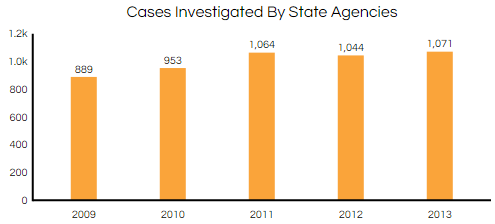
Source:NCRB
Data reveal that the involvement of private persons in corruption cases investigated by state agencies increased 20% from 889 in 2009 to 1071 in 2013. “The reason this is happening at such a large scale is two-fold: everyone is doing it and making money on the sly, so why not," said Duella. "Secondly, nobody goes to jail in many of the cases.”
After the incident, there have been many calls to make lobbying legal in India, a view echoed by Chhokar and Duella.
“I think lobbying should be made legal, and the names of the lobbying firms registered with industry bodies, such as Associate Chambers of Commerce of India (ASSOCHAM) and Federation of Indian Chambers of Commerce and Industry (FICCI). This is done all over the world in democracies. It strengthens systems and builds in transparency and accountability.”
(Devanik Saha is Data Editor at The Political Indian.)
_____________________________________________________________________
“Liked this story? Indiaspend.org is a non-profit, and we depend on readers like you to drive our public-interest journalism efforts. Donate Rs 500; Rs 1,000, Rs 2,000.”


